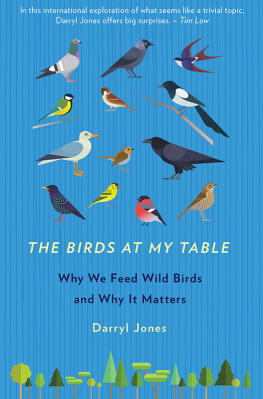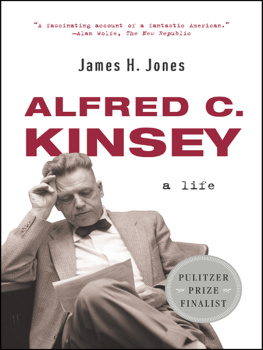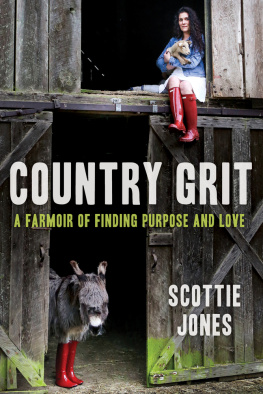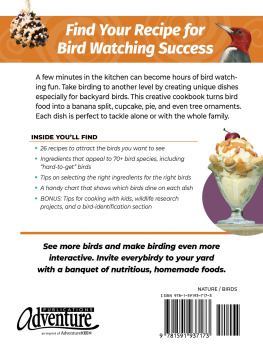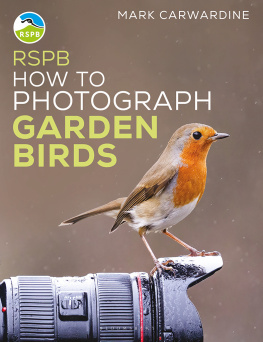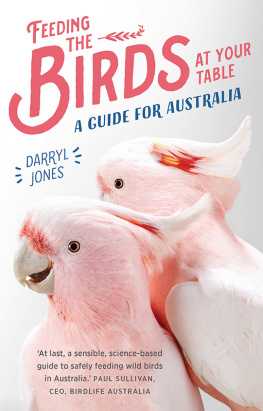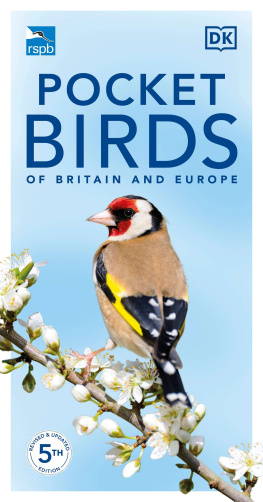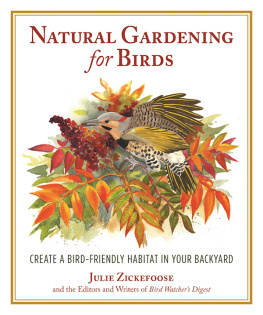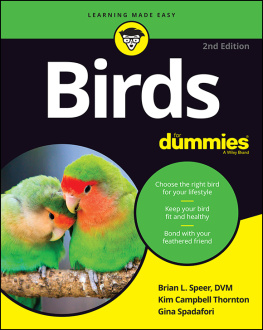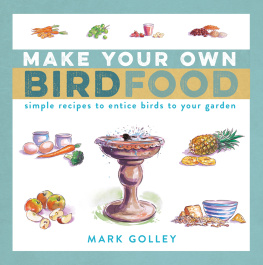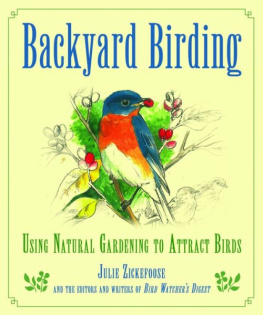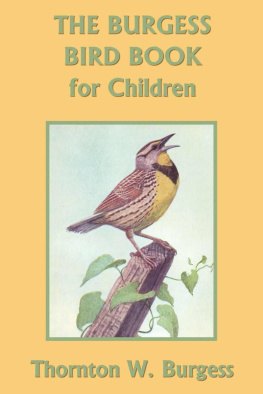THE BIRDS AT MY TABLE
THE BIRDS AT MY TABLE
Why We Feed Wild Birds andWhy It Matters
DARRYL JONES

A NewSouth book
Published by
NewSouth Publishing
University of New South Wales Press Ltd
University of New South Wales
Sydney NSW 2052
AUSTRALIA
newsouthpublishing.com
2018 by Cornell University
First published 2018 by Cornell University Press
Sage House, 512 East State Street, Ithaca, New York 14850
This book is copyright. Apart from any fair dealing for the purpose of private study, research, criticism or review, as permitted under the Copyright Act, no part of this book may be reproduced by any process without written permission. Inquiries should be addressed to the publisher.

A catalogue record for this book is available from the National Library of Australia
ISBN 9781742235974 (paperback)
9781742244235 (ebook)
9781742248653 (ePDF)
Cover design Scott Levine

This book is dedicated to Renee Chapman,
Dave Clark, and Josie Galbraith.
Pioneering a new look at an old practice.
CONTENTS
PREFACE
We love to feed birds. This very day, people throughout the world, from all walks of life, will willingly provide food for wild birds. The foods they offer may vary from discarded food scraps to elaborate home-prepared mixtures or expensively marketed products. These may be simply tossed onto the back lawn or presented via a complex system of tubes and platforms. Such activities may be as casual as a whim or undertaken with a specific goal in mind; they may be part of a vaguely regular routine or a carefully planned strategy. Whatever the process, the central idea is much the same: to provide food for wild creatures, usually close to home. It is often an intimate encounter; we are inviting birds to share our table.
For many of us this can be a profoundly moving experience, an almost magical interaction with nature. Providing food may also be a gesture of care, a heartfelt form of humane assistance to apparently fragile and vulnerable creatures. Lots of people feed birds as a way of aiding their welfare or their preservation, while others simply enjoy seeing wild animals close up. And there are a multitude of other reasons and motivations for feeding, some so obvious that they seem hardly worth mentioning. Feeding birds can be a simple, straightforward pastime as well as something deeply personal we may find difficult to explain.
For many of us, the most important aspect of feeding wild birds seems to be the experience, the improbable opportunity to see and interact closely with real wild animals. This sometimes involves feeding an un-tamed, untrained, free-flying bird directly by hand. Such an experience is frequently described with words of genuine personal emotion: privilege, awe, moving. More typically, the interaction is a bit more remote yet no less significant: seeing a group of wild creatures heartily partaking of the provisions we have supplied can be genuinely gratifying. These experiences may be different for each person, location, season, and setting. It can change day to day, even hour by hour; thats a key part of the pleasure and delight. Our regular visitors may always be right on schedule, but an unexpected arrival by an altogether unfamiliar species can be an exciting surprise. Keeping at least one eye on the feeder is always a good idea if you have the time; you never know what you might miss!
Its easy to see why this very popular pastime can become an obsession: the pleasure associated with seeingand providing forthese special visitors each day, with attracting a rare or unexpected species and feeling that you are contributing to the health or continued survival of precious creatures. For some people, these simple pleasures may also become something of an obligation, a daily commitment to uninterrupted provisioning. This dedicationor compulsionraises some significant questions that also need to be considered. What would happen to the birds if we couldnt provide these supplies regularly? Would they be able to cope? Would they have to move elsewhere? And might they have become dependent on our handouts?
This book is an exploration of this fascinating, complex, simple, sometimes compulsive human activity. It is also a serious attempt to understand the reasons why people feed wild birds and a consideration of the possible consequences. One way to start this journey is to visit some bird feeders from around the world as we attempt to unravel this popular, global activity.
It is early morning on November 1, and feeders are getting ready for the days arrivals...
Maine, USA. The first day of November has brought some unexpect- edly snowy weather to the Tilleys well-treed garden in the hills of northern Maine. Up at dawn as always, Janice Tilley is surprised by the dusting of new snow that greets her, but she is well prepared. Time for my special gorp, she announces proudly, retrieving several string bags of her own concoction (made from a well-guarded family recipe) from the battered fridge in the garden shed. All I will tell you is that I add seven ingredients to the lard, including walnuts and grape jelly. And the nuthatches love it! Winter is always tough for the birds that dont escape the cold. The fat really seems to help; they scoff at the sweet bits, but its the lard that builds them up. I honestly think that my winter provisions are keeping a whole bunch of chickadees alive till spring.
Gwynedd, Wales. For Jim Griffith, who lives on the windy side of the Snowdonia Mountains in northern Wales, filling his collection of homemade little house feeders is now a daily preoccupation. The wintry winds have seen off many of his fair-weather visitors, but he still has a solemn duty in providing for some diminutive and secretive residents, a pair of robins, as well as some special new arrivals. They might look delicate, but these redbreaststheyre tough little blighters, says Jim, who has watched them taking turns to feast on the mealworms and peanut cake he replenishes every day at 6 a.m. and 2:30 p.m. My robins live right here, he says, but the siskins seem to come in from the woods just for the thistle seeds. Today he waits, broom in hand, by his back door, to ensure that his favored clients are not disturbed by the unwelcome and downright brazen jays. The robins are my most reliable friends these days, Jim states quietly. I dont know what I would do without them.
Wellington, New Zealand. Early November weather is typically unpre- dictable in Wellington, at the bottom of the North Island of New Zealand, even though it is supposed to be summer. Sunny with a bloody good chance of rain, jokes Susie McGan, though her frustration is evident. The frequent showers are seriously disrupting her attempts to draw in the Tuis, one of the native sweet-toothed species that flock to her simple sugar-water feeder. There are always plenty of Waxeyes [Silvereyes] and the ubiquitous House Sparrows, but its the Tui that Susie really enjoys. So full of life and energy, they always fill me with joy. Here, providing regular seed attracts a remarkable variety of introduced species such as Goldfinches, turtle-doves and sparrows. I love them all, I really do, she explains, Its just that these Tui were really rare so recently. Its such a blessing to have them coming to visit now. By offering a little something that they appear to enjoy, I seem to be offering hopehope that we might be able to restore some of the damage we humans have done. Well, the return of the Tuis makes it seem possible.
Next page
